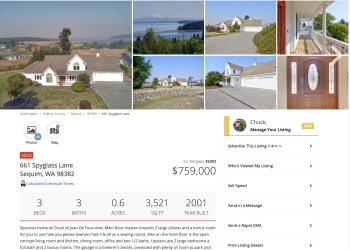Early possession is a touchy subject for home sellers, and that’s because they don’t understand how to gauge the risk factors for the buyer. Lawyers always tell sellers they should never ever agree to an early possession, and lots of non-lawyers are rendering opinions all over the Internet, many of which are dead wrong.
I’ll tell you exactly when an early possession is appropriate for a seller, and I’ll tell you exactly when it is not. I’ll list the risk factors a seller should consider, and you’ll see why this makes so much sense for both the buyer and seller.
First, I practiced real estate law for 20 years, and prior to and after that I was and am a real estate broker who has handled a lifetime of transactions. I’ve drafted many rental agreements before the days of online forms, I’ve represented landlords doing evictions, and I’ve drafted many early possession agreements. So I actually am an expert on this subject. I’ll give you the unvarnished truth, so you’ll know exactly how to analyze your options and make a wise decision.
Early possession does not come up very often, but it does periodically. Here’s the typical scenario. The buyer just sold a home in Santa Barbara, CA, and they have to be moved out by the 10th of January. They purchased a home in the famous Blue Hole known as Sequim, WA. They have the largest moving truck known to man scheduled to pick up a lifetime of possessions in Santa Barbara on the 7th or 8th of January, and arriving in Sequim, WA on the 10th of January. Because of apparent delays with the Christmas holidays and the Covid-19 shutdowns, nearly everything is taking longer than normal. Closing is on schedule for the 21st of January, and the loan officer agreed to expedite matters long ago so closing could happen by the 10th of January. The buyers bent over backwards and killed themselves to do all their due diligence and inspections, all that was required of their mortgage broker, and have complied with their contract with the seller to a “T”. In other words, these buyers have been stellar buyers.
Here’s the dilemma with major nightmare implications for the buyer. While the transaction may actually close early, if it doesn’t and they do not get early possession on the 10th of January, they will have to move twice with 25,000 pounds of personal possessions, which requires renting a storage facility, off loading everything into storage, hiring a moving crew, apart from the truck itself, and then doing it all over again a few days or a week later when they move into their new home.

This would very likely cost the buyers thousands of additional dollars, and a tremendous amount of stress moving twice. Let’s not even mention how many fragile family possessions and possibly heirlooms may get broke during the additional moving. Of course, the buyers also have to find a place to live during all of this, probably a hotel room. More expense and more discomfort. The older we get, the greater the difficulty of getting a good night’s sleep on a hotel mattress.
This is when the buyer asks the seller for a very short early possession. Notice the context here is a very short possession prior to closing, not 30 or 60 days. Normally the seller’s listing agent will have a conversation with the seller, and it seems like a reasonable request, so the seller will typically approve the early possession verbally. Then someone (friend or foe) tells the seller they need to see an attorney. Here’s what an attorney says EVERY SINGLE TIME:
“The liabilities are through the roof. Oh my God! What if your “tenant” decides they are not going to close their purchase, and what if they decide to live rent free in your home for the next year? How are you going to get them out? What if they destroy the property, doing $20,000 or $30,0000 in damage, and you have to hire an attorney to go after them to evict them and to recover a judgment for damages against them? Do you know how much an eviction costs? With state regulations hindering a landlord’s ability to evict tenants, you could have tenants who live there a long time rent free. I never recommend an early possession agreement. There are just far too many risks.” [And then you get a bill for $225 for a meeting and consultation.]
This is standard attorney advice to sellers, and it comes from attorneys who rarely specialize in real estate law. I was the only attorney in my market who specialized in real estate law and that was the focus of my entire practice and career, but most attorneys do a little divorce, a little bankruptcy, a little estate planning, and they pretend to be experts in real estate law and real estate transactions. And don’t forget, you pay them for their time by the minute. Let me add that these attorneys never ask about the buyer or any of the details of the transaction and the financial factors. Essentially, they commit malpractice by shooting off their mouths without all the facts and without a thorough analysis of the buyer’s and the seller’s situations. So let’s look at the real risk factors for a seller.
Early Possession Risk Factors
What are the risk factors of early possession for a seller? I’ll bet you’ve not seen this checklist anywhere on the Internet, and I’ll also bet no attorney you know has ever put this kind of list together.
- The total purchase price of the home is a major factor. The higher the price, the less the risk a buyer will turn into a tenant who wants free rent and lives like a pig. If a home is selling for $600,000 or $800,000, does anyone really think a buyer who spends that kind of money and qualified for a giant loan is going to turn into the mountain boys from the movie Deliverance? That would be irrational, but this is the default conclusion attorneys make when they advise sellers on early possession agreements. On the other hand, if a buyer was paying only $32,000 for an old 1976 double wide mobile home on a disastrous looking acre lot way out in the country, the risk of the buyer not being able to close or deciding not to close is much higher than the former buyer, although statistically it is still not likely.
- The amount of the down payment is a major factor. If the buyer is putting down $250,000, the risk of the buyer becoming a Dr. Jekyll and Mr. Hyde are virtually nil. On the other hand, if the buyer is buying a $32,000 mobile home and only putting down $5,000 at closing, the risk is substantially higher, but again the total percentage of home buyers who get an early possession and then do not close and must be evicted by sellers would be something like 1/1000th of 1 percent of all home buyers. But again, not to harp on this, but your “average” attorney does not take this into consideration either.
- The credit worthiness of the buyer is a major factor. The risks are at opposite ends of the spectrum for a buyer who has perfect or nearly perfect credit and qualifies for a large loan, and the buyer who has a low credit score for a small loan. These two buyers should not be put into the same sandbox when it comes to evaluating an early possession risk for a seller. Do attorneys even ask about this factor? No, they do not.
- The character of the buyer is a major factor. One buyer couple has a full lifetime of success and extraordinary career stories, service in their communities, and sometimes they were CEOs or ran healthcare facilities or were police detectives or firemen. These people of good character and high credibility are in the lowest risk category of all people when it comes to an early possession. They are not going to stab a seller in the back in any way, let alone living rent free or damaging the property.
- The buyer’s purpose for moving and buying a home is a major factor. If a buyer is wanting a little cabin or a getaway home somewhere far from where he lives, or if the buyer is buying a second fixer upper, it probably is a good idea to wait until closing to hand over the keys. The risk of a legal problem with an early possession agreement is not statistically high, but it is certainly much higher than a second scenario. The second scenario is where a buyer is moving from one part of the U.S. to another part by selling their home and severing all ties, and at the same time moving across the country to retire in their new permanent home where they intend to live the rest of their lives. In this new town they buy their dream retirement home, and if they end up with this nightmare trying to coordinate the moving trucks as described above, the risk that these kinds of buyers are going to implode their own retirement plans by not closing or by trying to live rent free . . . is so low, it is ridiculous to even think they would behave so uncharacteristically.
Table of Risk Factors for Early Possession
If you analyze these five early possession risk factors, you will be able to intelligently and wisely consider the buyer’s request for possession prior to closing, and while this could be blown off by the seller as “this is not my problem,” I think it’s entirely valid and important for a seller to consider the costs, stress, and nightmare the buyer can find themselves in through no fault of their own and after agreeing to the seller’s price and terms. Remember, the buyer’s closing date subjects them to the mercy of the mortgage company, their loan processor, their appraiser, and their loan underwriter. A buyer who is ready, willing, and able to close should not be penalized for the delay of other professionals in the mortgage industry.
Lastly, a seller should be grateful for the buyer and their cooperation, and for getting their price. It is a considerate and generous decision to give a buyer early possession, provided they satisfy the five elements above. It is also reasonable and practical. Life is hard enough without making it harder for others, especially if doing so is unnecessary.
Last Updated on January 5, 2021 by Chuck Marunde
























































Is there any risk to the buyer for early possession on a new build that they are expecting credits on. The build has been paid in full. The builders stated that they could move in early but he wouldnt be ready to close for 45-60 days. If they take early possession what does that mean for their credits and or completion date? Is the completion date the day they close? Or the day they are able to move in with the early possession clause?
These are questions for the builder, and make sure you put everything in writing.
Hmmm, 99% of the time not a great idea. And how did this transaction go for your clients? Did they get in early or sleep on a crappy bed?
Summer, most people think that 99% of the time it is not a great idea, but that must be qualified, because in 90% of the cases with all my buyers it would be practically zero risk and would be a great idea. How can I say that? Re-read the risk factors I list in the article. 90% of my clients have none of these 5 risk factors at all–meaning their risk is as near to zero as you can get on all five. Now let’s move to what most people are thinking when they say it’s not a good idea. It would not be a good idea, and I would never support an early possession, in a case where the price is a low end price, and/or the buyer is financing 100% or 90% of the purchase price, and/or the buyer has bad or poor credit, and/or, the property being purchased is not just a low price, it is a dumpy place or a cheap mobile home, and/or, the buyer’s job history is not stellar (meaning he wasn’t a professional like a doctor or a dentist or an architect or a college professor (you get the point), and/or the buyer’s purpose for moving and buying a home is other than a long term plan like retirement (i.e. short term move or a getaway cabin or a rental investment). Put two or three or all of these together, and then I would say “IT’S NOT A GREAT IDEA TO APPROVE AN EARLY POSSESSION,” but take them all away with an incredible buyer who is one of the finest Americans you could meet with a lifetime of success, a long term career success, a retirement plan, a huge down payment (like $250,000 to $500,000), and a perfect credit score, and it would be a “GREAT IDEA TO APPROVE AN EARLY POSSESSION” if it saved this buyer from a lot of stress and unnecessary double moving and another $10,000 in moving costs.